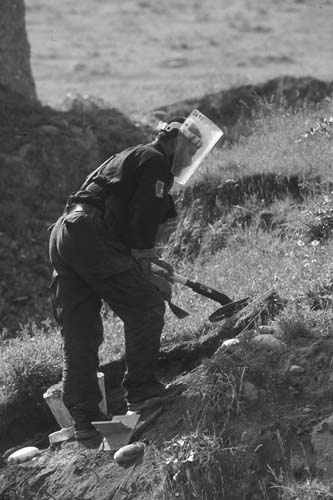Japan's Official Development Assistance White Paper 2006
Main Text > Part II ODA DISBURSEMENTS IN FISCAL YEAR 2005 > Chapter 2 Details about Japan's ODA > Section 2. Measures for Each of the Priority Issues > 4. Peacebuilding > (5) Anti-Personnel Landmines and Small Arms and Light Weapons (SALW)
(5) Anti-Personnel Landmines and Small Arms and Light Weapons (SALW)
Anti-personnel landmines, which have been buried mainly in regions where conflicts have lasted for many years such as Cambodia and Afghanistan, and illicit small arms and light weapons (SALW), which are used in conflicts, crimes, and the like and have produced a large number of victims, are a grave humanitarian issue because they have indiscriminately killed or injured even non-combatants, such as civilians including children. Furthermore, these landmines and weapons could hinder reconstruction and development activities or cause the recurrence of conflicts.
Chart II-24 Disbursements to Assist Countermeasures for Antipersonnel Landmines since FY1998


An effort to remove landmines in Afghanistan
Japan's ODA Charter and the Medium-Term Policy on ODA state, from the perspective of peacebuilding, that particular consideration will be given to providing assistance to enhance the capacity of developing countries regarding import and export control of weapons, prevention of illicit arms trade, development of legal systems, and other areas, in order to prevent conflicts. These also state that special consideration will be given to the recovery and destruction of weapons, including landmines and small arms, and to the capacity development of landmine victims etc., in order to ensure national stability and security within the post-conflict countries.
A. Assistance for Mine Action Projects
Under the "Zero Victims Program,"47 Japan has been actively providing assistance to various efforts of mine-affected countries including demining, extending over ¥23 billion since 1998 (as of the end of March 2006). At the first Review Conference of the Convention on the Prohibition of the Use, Stockpiling, Production and Transfer of Anti-Personnel Mines and on Their Destruction (Ottawa Convention) held in December 2004, Japan announced its new policy on landmines in which it would continue to provide assistance for mine action on a similar scale to the previous support, with an emphasis on Asia, the Middle East and Africa according to the following three principles: (1) contribution to peacebuilding, (2) valuing the perspective of human security, and (3) close cooperation between the government, NGOs, the private sector and academia, including in the efforts to promote technological development.
In FY2005, Japan continued to provide assistance through international organizations or other various funding schemes such as Grant Assistance for Grassroots Human Security Projects and Grant Assistance to Japanese NGOs' Projects. Additionally, in February 2006, Japan decided to support mine clearance activities in Burundi and assistance in the related capacity development (roughly US$550,000) for the Burundian staff members. This was done through Emergency Grant Aid as part of assisting their reconstruction and development efforts in the process of consolidation of peace. Moreover, because it is highly dangerous and time-consuming to remove landmines by deminers, Japan is also actively involved in the research and development of mine detection and demining technology, so that the safety and efficiency of mine clearance activities would be improved. Japan will continue to call for the elimination of landmines from the world, and to actively assist mine action projects that incorporate not only humanitarian but also long-term development viewpoints.
B. Support for Measures against Small Arms and Light Weapons
In a locally-based effort aimed at curtailing illicit trade in SALW Japan has supported projects that combine collection of arms with development, in which Japan provides infrastructure (such as the repair and construction of roads, wells and schools) to communities that have surrendered arms. In Cambodia, where this type of project has been in progress since 2003, more than 14,000 SALW had been collected by the end of March 2006. In addition, Japan decided in March 2006 to contribute more than ¥400 million through UNDP to projects for collecting SALW in Sierra Leone and Liberia. Through such efforts, Japan is strengthening its support to Africa, which suffers serious harm from SALW.
Japan has also been working to contribute to measures against SALW through broader efforts. In the project for collecting SALW described above, Japan assists the establishment of the related legal systems for the purpose of exposing and preventing the inflow of illicit arms, and also provides training to law enforcement agencies such as the police and customs agencies. Furthermore, under the joint sponsorship of the UN and other organizations, Japan held a SALW seminar in Beijing in April 2005 concerning measures against SALW by Central Asia and ASEAN, tracing, and other topics. To implement projects, Japan engages in close cooperation with international agencies and NGOs with experience and knowledge. In the five years since the United Nations "Program of Action to Prevent, Combat and Eradicate the Illicit Trade in Small Arms and Light Weapons in All Its Aspects," which serves as the guideline for countries taking action against SALW, was adopted in 2001. Japan's contribution to efforts to reduce SALW has come to approximately ¥30.5 billion.
In a visit to Ethiopia and Ghana by the then Prime Minister Junichiro Koizumi in April and May 2006, and in the United Nations Conferences to Review Progress Made in the Implementation of the Programme of Action to Prevent, Combat and Eradicate the Illicit Trade in Small Arms and Light Weapons in All its Aspects held in June, Japan declared that it would continue to strengthen its support for measures against SALW.


 Next Page
Next Page